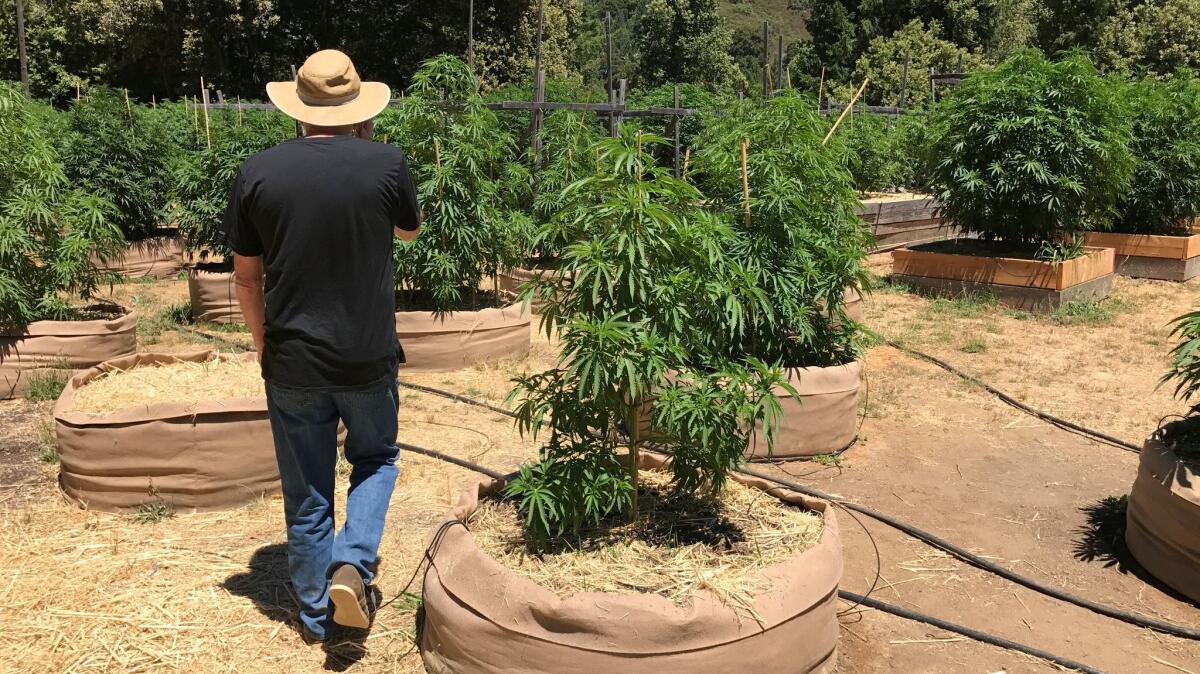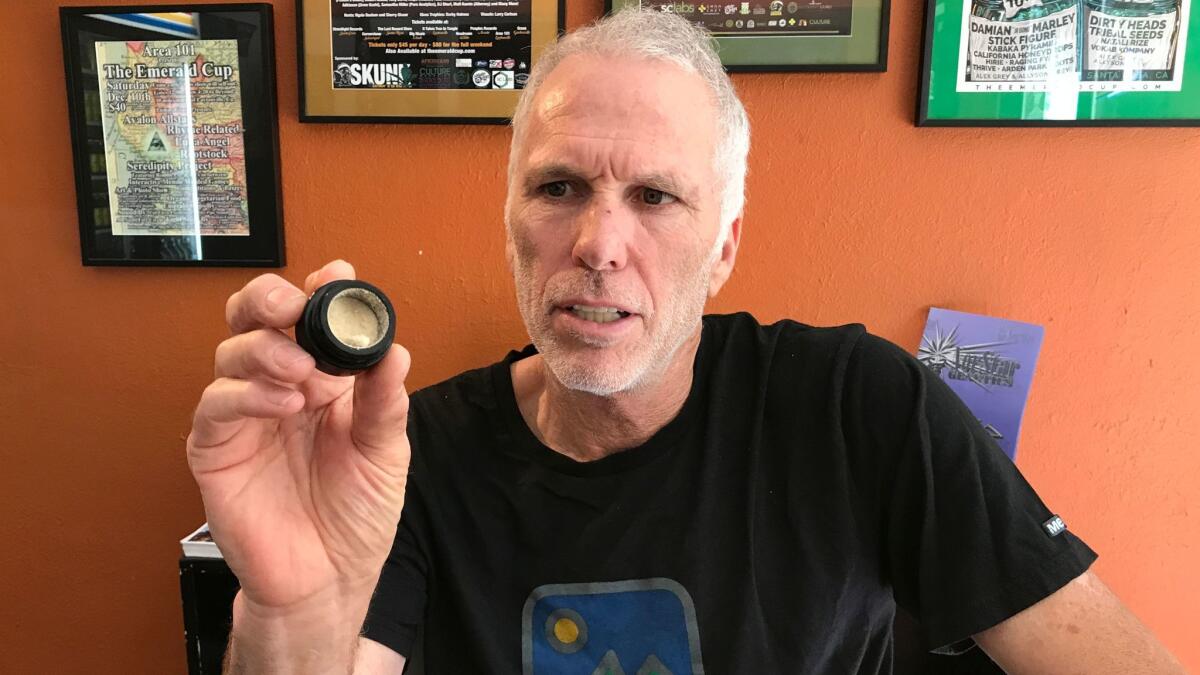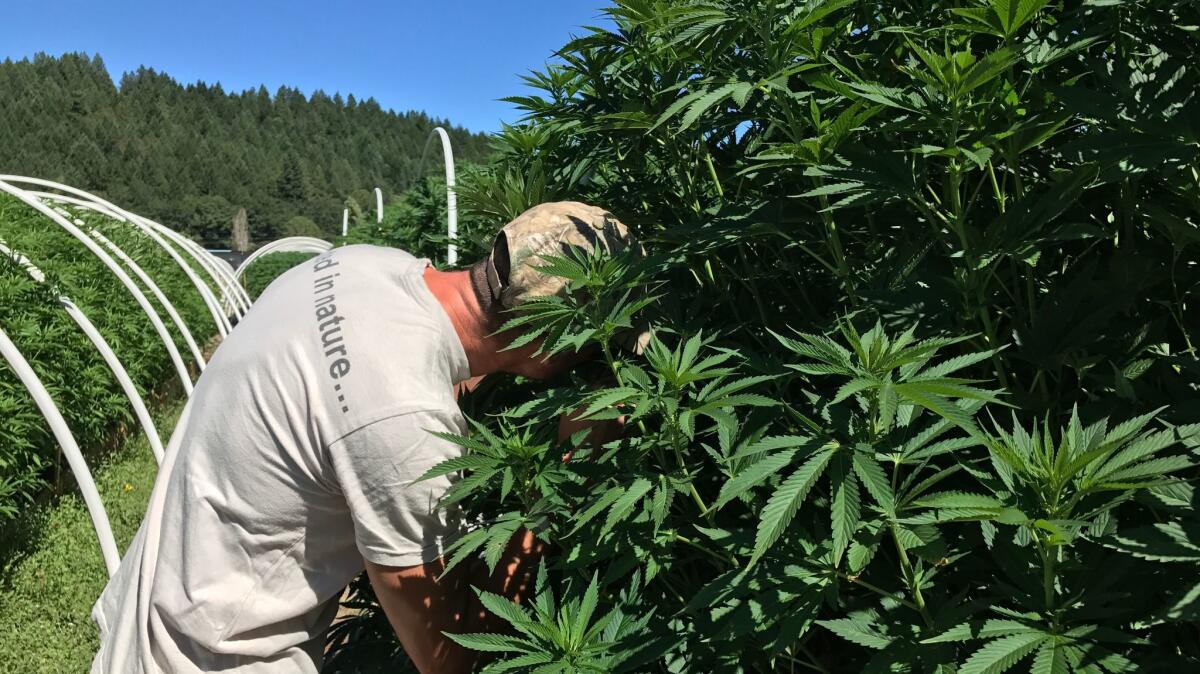California Journal: A veteran pot farmer mourns the passing of a more paranoid, more profitable way of life

- Share via
Reporting from Laytonville, Calif. — Tim Blake has been pursued by police, arrested, jailed, ripped off in the fields by thuggish neighbors and hogtied by Hell’s Angels.
Naturally, he is one of Mendocino County’s most upstanding citizens.
Blake is a longtime cannabis grower and entrepreneur. His Healing Harvest farm produces top-quality product, and he owns Area 101, an iconic dispensary and gathering spot just off Highway 101 near tiny Laytonville, about three hours north of San Francisco.
Nearly 15 years ago, Blake founded the Emerald Cup, a post-harvest celebration and county fair-style contest that draws thousands of cannabis aficionados to the Sonoma County Fairgrounds each December. At the very first contest, the first- and third-place winners for best flowers didn’t show up. They feared arrest.
Nine years ago, Blake and some of his cannabis-growing colleagues had a political epiphany.
“It dawned on everybody that we are a cannabis county,” Blake told me the other day at Area 101.
“The sheriff could not get elected without our vote — and our money. All of a sudden we realized we are a power: ‘How are you going to work for us?’ ”
He decided to embrace the very people he had once feared. He hosted political debates with candidates running for sheriff and district attorney. Not all his friends were pleased.
“My life was threatened by people up on Spy Rock, an infamous place that’s a community of hardcore growers,” Blake said. “They didn’t like the fact that I was opening this up. I told them, when you’re getting robbed, who do you call? You want the cops up there to protect you.”
Mendocino County soon became the first county in the country to permit the farming of medical cannabis, which state voters had legalized in 1996.
And then the feds cracked down, threatening to sue county officials.
“The supervisors said, ‘Now we understand what you guys are going through,’ ” Blake said. “It was a revelation.”

Blake is a slender 60-year-old father of three whose up-and-down career has roughly paralleled the tumultuous California marijuana industry. I’m going to predict that someone, somewhere, is going to make a movie of his life.
Like a lot of baby boomers, he tried pot for the first time as a teenager. In Sunnyvale, at age 14, he began selling “lids” to friends. He grew his first plants at 16. In the ensuing decades, he has never not sold pot.
Before President Nixon declared drug abuse “Public Enemy No. 1” in 1971, and conflated pot with heroin, cannabis flowed to the U.S. from places like Thailand, Colombia and Mexico. “You didn’t need to grow it,” Blake said.
But the war on drugs changed everything. Supplies dried up, and demand never waned. Of necessity, California became a pot-growing capital.
In rural Northern California, the combination of hot days and cold nights made for perfect growing conditions. High-quality marijuana could be grown in the mountains, out of view, hidden amid trees. People also began perfecting indoor growing techniques.
In “Cannabis Crusader,” a memoir Blake self-published two years ago, he recounts harrowing stories about rip-offs and snitches and police raids, about how the push for mandatory minimum sentences for drug-related crimes turned a relatively peaceful industry into a high-stress, paranoid world and eventually drove it into the redwood regions of Northern California.
“I had a friend who got busted for 7,000 pounds, and only did 18 months in county jail,” Blake said. “Two years later, with mandatory minimums, that crime would have got him 10 to 15 years in prison. And then it became, it’s not fun anymore. This is serious stuff.”
I asked him, with all the stress and traumatic episodes, why he didn’t just go back to selling commercial real estate. “Because I believed in cannabis,” he said. “I didn’t know how medicinal it was back then, I just knew it was good for people. They think better thoughts. They play with their dog. They talk to their old lady.”
(I take slight issue with that characterization; plenty of people don’t like the way pot makes them feel, it can be addictive for a subset of users, and teenagers should avoid it.)
Once it began to be clear that marijuana does indeed have medicinal value — for children suffering from epilepsy, for cancer patients with no appetites, for people with chronic pain or post-traumatic stress disorder — Blake said he knew the end of prohibition was inevitable.
And, he said, expressing a sentiment I have heard from other cannabis proponents: “It became a crime against humanity to withhold. At some point, there will be a reckoning.”

Now that California voters have legalized pot for adult recreational use — regulations go into effect in January — small growers like Blake will have only a few years before they could be squashed by big greenhouse growers in the Salinas Valley and the deserts of Southern California, who will be pumping good-quality, low-cost weed into the marketplace.
Already, Blake said, prices have dropped dramatically. He knows Emerald Triangle farmers who have not been able to sell all of last year’s crop.
The one-time cannabis outlaws of Humboldt, Trinity and Mendocino counties either will distinguish themselves with high-end niche products the way some spirits makers have done, or they will vanish like the loggers who were once the lifeblood of this place.
“The best ones will have a chance,” said Blake, who is perfecting an expensive, hash-like concentrate made from a high-quality strain of bud that is frozen in the field as soon as it is harvested. He also has switched some of his fields from standard cultivation — one harvest per year — to a technique called light-deprivation, where plants are covered between 5 p.m. and 10 p.m. to trick them into flowering faster.
For a region whose economic stability has grown dependent on the all-cash cannabis industry, things could get ugly.
This weekend, Blake had planned what he called a Cannabis County Fair for Laytonville. It was to have been a summertime version of the Emerald Cup. For various logistical reasons, it got canceled. Which was just as well.
He was worried the event would be less like a celebration and more like a wake for all the folks who are about to get left behind.
Twitter: @AbcarianLAT
ALSO
When it comes to regulating marijuana, can we ever count on Los Angeles to do the right thing?
Cannabis workers, once facing legal peril, get the California seal of approval
More to Read
Sign up for Essential California
The most important California stories and recommendations in your inbox every morning.
You may occasionally receive promotional content from the Los Angeles Times.











